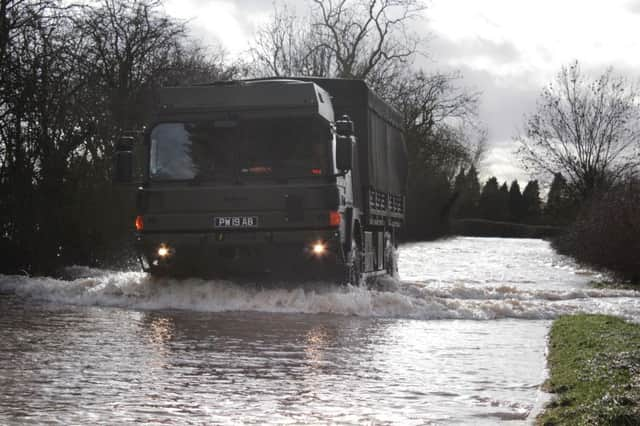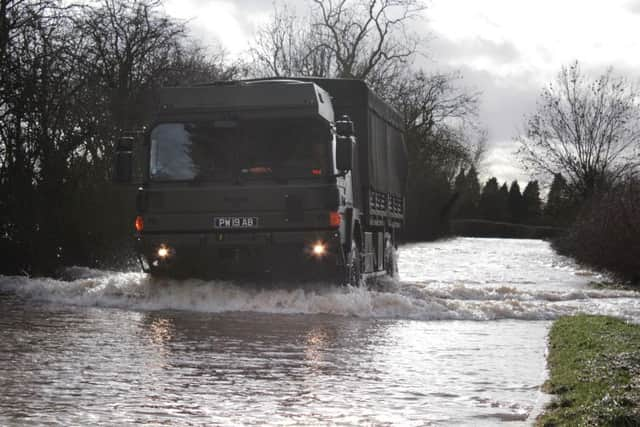Flood victims forced to ring costly helplines


Consumer champion Which? raised concerns that claimants were often forced to dial 084 or 087 numbers, running up bills of up to 41p a minute.
Floods minister Dan Rogerson insisted during talks in the Cabinet Office yesterday that the industry had “got the message” about the helplines – used by 79 per cent of home insurers including big names such as Ageas, Aviva, Axa, Churchill, Direct Line, Esure, Hiscox, Royal and Sun Alliance and Virgin, according to Which? research.
Advertisement
Hide AdAdvertisement
Hide Ad“When it comes to telephone numbers, yes, we raised that and the industry are happy to say that they are taking that back to their members to deal with,” he said. “We got the message across today that we would hope that they would address that, and the Association of British Insurers and the members’ companies that are represented there – [although] of course, they can’t speak directly for every single member company – took that away and they will be looking at that and we will keep that situation under review.”


Mr Rogerson added: “What we were focusing on today was making sure that people are out there on the ground and you saw that. That’s very reassuring.”
Labour questioned the motivation for the meeting, claiming it was a “vacuous PR stunt”.
Shadow Cabinet Office minister Michael Dugher said: “The government’s transparent attempt to try to grab a few headlines does nothing for those affected by the floods. Three hapless junior ministers booking a meeting room does not constitute a serious response to the flooding crisis. But it is indicative of David Cameron’s whole approach – out of touch and totally complacent.”
Around £14 million has been paid out in emergency claims, typically between £500 to £3,000 per claim, and £24m has gone on emergency accommodation, according to the Association of British Insurers (ABI).
It said insurers dealt with more than 170,000 claims for damage caused between 23 December and 8 January, but more recent figures were not available.
ABI chiefs described the meeting as “constructive” and said the industry would hold regular meetings with ministers “as the process of response is delivered through the rest of this year”.
Aidan Kerr, the ABI’s head of property, said ministers had not made any demands on the industry about the response and refused to rule out a hike in premiums as a result of the floods.He said: “They were just asking for information about the process and in the meeting we outlined what insurers are already doing and have been doing since the start of December.
Advertisement
Hide AdAdvertisement
Hide Ad“It was more that they wanted to be reassured about what the industry was already doing.”
Asked about the potential cost to householders, he said: “It’s far too early to say what will happen to premiums.
“The industry position is that there should be a zero-tolerance approach to inappropriate development on flood plains.”
Severe flood warnings, indicating danger to life, remain in place on the Somerset Levels, with a further 109 warnings across England and Wales. The Environment Agency (EA) said river levels would start to fall gradually this week, but warned the Severn posed a risk of continued flooding in Gloucestershire and Worcestershire until tomorrow.
Groundwater flooding remained a cause for concern in Berkshire, Hampshire, Surrey, Sussex, Kent and parts of London, and there was a risk of coastal flooding for north Cornwall and north Devon, and at Chiswell and Preston Beach in Dorset from tomorrow through to Saturday, the EA said.
Mat Crocker, the EA’s flood risk duty manager, said: “It is an improving picture across most of the country, but we will continue to see the impact of flooding for many days to come.”
Following the meeting between ministers and the ABI, it was announced that there will be monthly meetings between the government and the insurance industry to ensure claimants receive full and prompt payment.
The industry will also provide a team of technical experts to advise the Department for Communities and Local Government and the Department for the Environment, Food and Rural Affairs on the payment of grants to help homeowners and businesses flood-proof their properties.
Advertisement
Hide AdAdvertisement
Hide AdIt emerged yesterday that the flooding crisis is causing further anguish for bereaved families as wet ground is making burials “impossible” in the worst-hit areas. The floods have created dangerous conditions for gravediggers and one crematorium will be closed for around two months due to flooding.
UK ranked seventh globally for flood risk
The UK is among the ten countries in the world at greatest economic risk from flooding, according to a new global ranking.
The United Kingdom is ranked seventh highest globally for the potential economic consequences of exposure to flooding, behind the US, China, India, Bangladesh, Germany and Japan, according to an index produced by UK-based risk analysis company Maplecroft.
The findings are part of the firm’s fourth annual Natural Hazards Risk Atlas, which assessed 197 countries on physical and economic exposure to 12 types of natural hazards, including flooding, storm surge, earthquakes, tsunamis, cyclones, wildfires and volcanoes.
The ranking is produced annually to help companies and insurers identify risks to assets worldwide.
The latest index put the UK 42nd most at risk for physical exposure to flooding, but its high population density and the proximity of commercial centres, property and infrastructure to areas susceptible to flooding means its non-agricultural economic exposure to flooding is the seventh highest in the world.
According to the latest Natural Hazards Risk Atlas, the UK’s economy also faces the world’s highest exposure to extra-tropical cyclones – the type of storm seen over recent weeks – which Maplecroft said are considered the most operationally disruptive and costly natural hazard facing northern Europe.